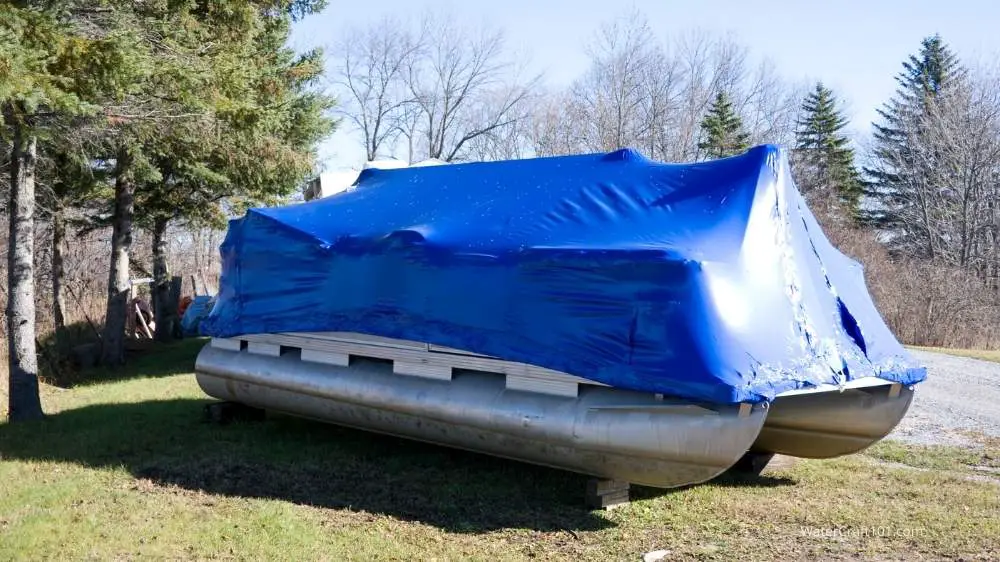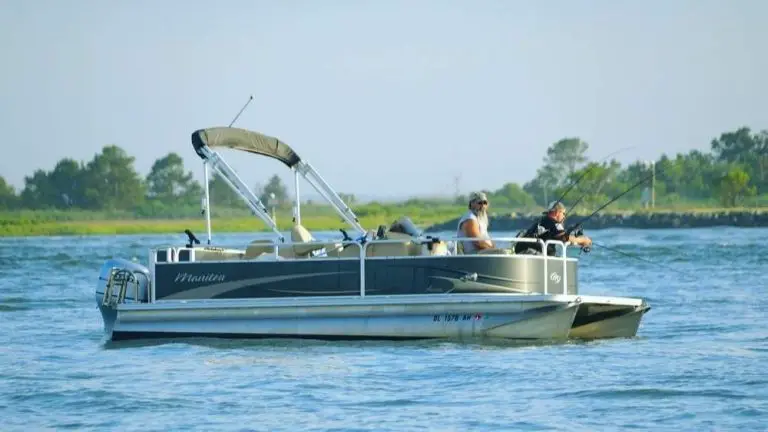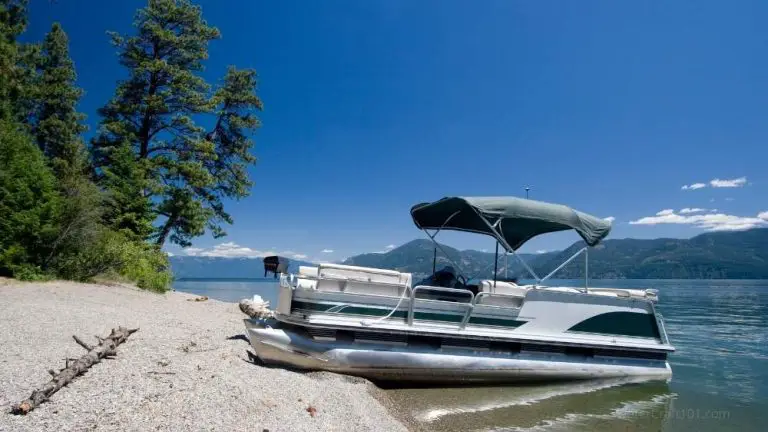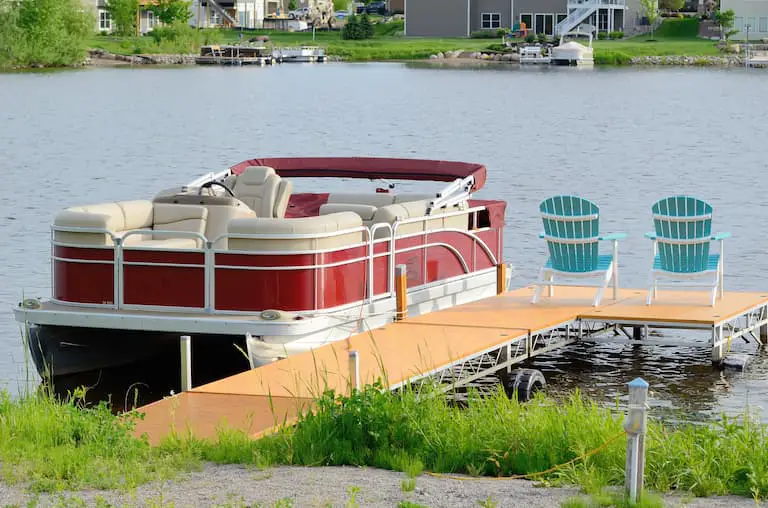How To Store a Pontoon Boat for Winter (10 Tips)
If you are a fan of recreational watercraft, then you will agree that pontoon boats are an excellent investment. However, unlike summertime when you can hit the water with your loved ones, winters present a different scenario altogether. If you’re wondering about how to store a pontoon boat for winter, you’ve come to the right place.
Here are 10 tips on the best way to store a pontoon boat for winter:
- Make timely plans for winter storage
- Clean the interior and exterior of the boat thoroughly
- Perform any needed repair work
- Take out any accessories or equipment
- Check all the drains before storage
- Invest in a sturdy cover
- Remove the battery and keep it charged
- Fill the gas tank for proper engine care
- Inspect the trailer before storing your boat
- Perform regular checks
By reading this article, you will learn why it’s essential to keep your pontoon boat away from the water during the cold season and some excellent storage tips to keep your recreational watercraft in tip-top condition during the winter.

Why Is It Important To Store Your Pontoon Boat During the Winter?
Your pontoon boat is at a high risk of damage from the elements during winter, which can result in high repair costs. For instance, scum and algae may build up on your boat’s exterior during winter, causing extensive damage.
Therefore, it is crucial to prepare your boat adequately for the winter season to prevent damage and keep it in pristine condition ready for the summer. In the next section, I will provide some important tips on winterizing your pontoon boat during winter.
1. Make Timely Plans for Winter Storage of Pontoon Boat
One of the common mistakes many pontoon boat owners make is to wait until the last minute to prepare their boat for the winter. As you will notice, preparing your boat for storage involves numerous considerations, and as such, failure to prepare early enough may result in many issues.
For instance, if you wait too long or till the last minute, your boat may start to collect snow or ice, which can cause costly damage to your boat’s components, requiring different levels of repair before safely placing it in storage.
As a rule of thumb, make preparation early to avoid last-minute rushes.

2. Clean the Interior and Exterior of the Pontoon Boat Thoroughly
It is vital to ensure that your boat is clean from top to bottom before storage. One of the common mistakes boat owners make is covering the boat during winter without first scrubbing out all the built-up grime and algae.
This algae and grime can build up during winter and damage some of the critical components on your boat.
Therefore, you should scrub your boat thoroughly both inside and outside. Additionally, sweep the deck to eliminate any debris and leaves that could rot and create a haven for mildew and corrosion.
Use a soft bristle brush such as the Everspout Foot Scrub Brush or the Star Brite Marine Deck Brush (both on Amazon.com) to scrub your boat clean in every crevice. Target all areas when scrubbing your pontoon boat to ensure all mildew and potentially harmful substances are completely removed.
After cleaning your boat, apply mildew and rust protection to keep the vessel dry. These products are easy to find and include the 303 Marine Aerospace Protectant (love this stuff!) and the Star Brite Ultimate Mildew Stain Remover (both on Amazon.com).
Alternatively, adding a wax coat helps your boat withstand UV rays’ impact and also provides a nice shine. The Ethos Ceramic Wax Pro or Meguiar’s Flagship Premium Marine Wax (both on Amazon.com) are some excellent waxing options you can try out.
All these activities will not only protect your boat’s components and parts against damage from corrosion, rust, or mildew during storage but will also mean you will have less work to do when preparing your boat for summer use.
3. Perform Any Needed Repair Work on Your Pontoon Boat Before Storage
It is common to notice damage on your boat after or before general cleaning sessions. This may include leaking faucets, corroded parts, damaged wood on the deck, and others.

This damage is entirely normal due to the high level of activity during the summer season.
If your boat has any damage from the elements or sun exposure, it is prudent to repair these areas as soon as possible.
Placing your pontoon into storage without running the proper repairs puts your pontoon boat at a high risk of exacerbated damage during the winter period, as already discussed above.
To err on the side of caution, you can contact professional repair services to assess and evaluate the condition of your pontoon before storage. This may help you determine potentially problematic areas that you may have missed.
4. Remove Accessories or Equipment From The Pontoon Boat For Winter
Leaving any accessories, equipment (fishing or watersport), and gear on the boat will almost certainly result in moisture buildup. These accessories and kits include towels, water skis, fishing rods, taps, and other accessories.
Remember, these items can also collect mold and mildew during storage, resulting in potentially costly equipment damage. The mildew and mold can spread quickly to other parts of the pontoon during winter, leaving you with a lot of work to do during summer.
To save you the pain of budgeting for new equipment and gear after winter, it is best to take anything that does not have to be in the pontoon boat out and store them in a safe, dry place.
Removing your equipment and gear also protects this equipment against theft. Ideally, you should place these items inside your home for enhanced safety.

5. Check All the Drains on Pontoon Boat Before Storage
Ensure that all the drains in the pontoon are working adequately before placing your boat in storage. One common mistake that can cost you dearly is not checking the drains before storing the pontoon boat, which has critical implications on your boat’s drainage system.
The above concerns arise because water left in the drainage system will likely freeze during winter. Naturally, when water freezes, turning from liquid to solid, it expands and increases in mass. This expansion can cause breakages in the plumbing system or block the drains.
Therefore, checking the drains before storage can potentially save you a lot of time and money in repairs.
You should also remove the bilge drain plug and ensure that all excess water has exited the pontoon boat.
6. Invest in a Sturdy Pontoon Boat Cover For Winter
This is perhaps the most crucial tip for storage because it protects your pontoon boat from the elements as well as rodents. Accordingly, you need to purchase a boat cover to keep the elements at bay.
There are numerous options in the market, including the following that are available on Amazon.com:
- EliteShield 600 Denier Boat Storage Cover
- iCOVER Trailerable Pontoon Boat Cover
- KING-BIRD Heavy-Duty Pontoon Boat Cover
- RVMasking Waterproof Trailerable Pontoon Boat Cover
- Konelia Pontoon Boat Cover
All the above-mentioned boat covers are made of quality materials and manufactured by reliable brands, which ensures they provide maximum protection to your pontoon boat for several winter seasons before needing a change.

While a sturdy pontoon boat cover will provide a much-needed layer of safety to your boat, there are additional actions you can take to enhance overall safety.
For instance, you can choose to shrink wrap your entire pontoon boat before covering it. Doing this will keep moisture at bay during storage, ensuring all the internal components are tightly covered.
Additionally, shrink wrapping will prevent your cover from sagging due to accumulated snow or downpour.
Remember, the pontoon cover could collapse under the weight of accumulated snow and rainfall, potentially damaging your boat’s deck or furniture.
You can also check on your boat regularly during storage, watching out for snow or moisture buildup that may cause collapse.
It is also advisable to spray your boat cover with some type of rodent and insect repellent to prevent these creatures from chewing through the cover.
Remember, holes resulting from rodent or insect activity could allow water to seep through the cover, which could damage your boat.
Products such as the Mighty Mint Rodent Repellant Spray (on Amazon.com) will go a long way in protecting your cover against rodents during winter storage.
Related: How To Keep A Boat Dry Under a Cover? (Complete Guide)
7. Remove the Pontoon Battery and Keep It Charged During Winter Months
While batteries can hold a charge for several weeks, your battery will likely go flat during winter storage if you leave it in.
You should remove the battery and keep it in a safe, cool, and dry storage area as good practice. While in storage, use a charging device such as the SUHU Battery Trickle Charger (on Amazon.com) to ensure your battery does not go flat.
You can also choose to charge the battery regularly to prevent a complete discharge while in storage, although the trickle charger option is preferred. This is important because you want your battery to be ready and fully charged when you take your pontoon boat out of storage.
8. Fill the Pontoon’s Gas Tank for Proper Engine Care During Winter
Filling the pontoon’s gas tank is vital for several reasons. First, it displaces any air that may still be in the gas tank. This prevents the air from condensing while inside the gas tank during storage, especially if you have stored your boat in unheated conditions or outdoors.
Secondly, filling the gas tank allows the fuel to circulate through the entire fuel system, protecting your pontoon boat against corrosion or rust in the engine parts. Once more, there are additional actions you can take to ensure proper engine care, including the following:
- Change the oil filters and oil. This ensures that the oil on the pontoon boat during storage is clean.
- Add a fuel stabilizer. Adding a fuel stabilizer such as STA-BIL Storage Fuel Stabilizer or STA-BIL 360 Marine Ethanol Treatment and Fuel Stabilizer (both on Amazon.com) will keep the oil from breaking down while protecting the engine components against corrosion and rust.
- Run the pontoon’s engine periodically. Running the engine once in a while will allow for the fuel to circulate through the engine components.
- Spray fogging oil inside the spark plug holes and carburetor. Fogging oil has anti-corrosive properties. Therefore, spraying fogging oil will keep these parts fully coated and protected against corrosion. Some of the effective options in the market include the Star Brite Professional-Grade Fogging Oil and Quicksilver Storage Seal Engine Ffogging Oil (both on Amazon.com).
- Drain the engine coolant. While you can opt to drain the engine block during winter storage, the manufacturer’s manual may recommend filling the engine block with RV antifreeze after draining the coolant during storage. A non-toxic propylene glycol-based option is preferred over an ethylene glycol base for its low toxicity.
If unsure, refer to your pontoon boat’s manual to determine the kind of engine on your boat and its proper maintenance. After all, you want your boat up and running come spring, with minimal mishaps, if any.
9. Inspect Your Pontoon Trailer Before Storing Your Boat
It would be best if you ideally stored your pontoon boat in a clean and dry space. If you store your boat on a trailer, it is important to thoroughly inspect it, keeping an eye out for tire issues, leaks, or damaged lights.
Ideally, you want your trailer working effectively come the next boating season.
Additionally, you should ensure that your pontoon boat is adequately secured to the trailer. This means checking to confirm that you have tightened all safety harnesses correctly. As a good rule of thumb, you should check that any safety chains are secure enough to prevent your pontoon boat from toppling.
10. Regularly Check Up on Your Pontoon Boat in Winter
Even after following each of the tips above, there is still a small chance that your pontoon boat may be susceptible to damage due to factors such as water, gnawing, animal droppings, and other issues.
Making regular checks on your boat is therefore essential as it helps you spot any issues that you may have missed earlier on.
On this note, leaving your pontoon boat in storage for the entire winter without checking on it is not advised.
Summary
Pontoon boats are a worthy investment and could serve you for a long time without any mishaps if well-maintained and stored. Once you know how to store a pontoon boat for winter properly, you’ll be that much more ready when boating season hits.
If you are still having trouble figuring out the best way to store a pontoon boat for winter, the tips below will do the trick:
- Contact professionals to help you identify and repair any issues before storage
- Refer to the manufacturer’s manual to determine your boat’s maintenance and care needs before and during winter storage.
- Always be on the lookout for any issues during storage and resolve them as soon as possible.






